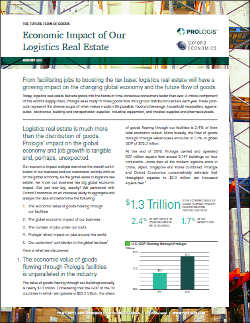Ungated Post | 10 Nov 2017
The Future Flow of Goods

Warehouses and distribution centers facilitate the commercial flow of goods across the world. Nearly every product purchased by consumers and businesses will have passed through a warehouse or distribution facility. Oxford Economics undertook a custom, data-driven assessment of Prologis warehouse and distribution facilities to better quantify and describe the economic value of goods that flow through their facilities, the number of jobs under Prologis roofs, as well as jobs supported through the economic activities of Prologis tenants and the tax implications of all economic activity associated with Prologis’ warehouses and distribution centers.
In 2016, Prologis, the world’s largest owner of warehouses and distribution centers, owned or operated 627 million square feet of warehouse space across 3,147 buildings in 19 countries. Approximately $1.3 trillion worth of goods flow through these facilities annually—which accounts for 1.7% of global GDP. About 816,000 people work under Prologis roofs, specifically for Prologis tenants who lease warehouse and distribution center space. The economic activities of Prologis’ tenants and employees support an additional 1.55 million jobs globally. In context, if the employment supported by Prologis and their tenants were a US city, they would be the fourth largest—ahead of Houston, Philadelphia and Phoenix.
Within the US, the economic activity supported through Prologis warehouses and distribution centers generates about $16.7 billion in federal, state and local taxes.
Oxford Economics’ team is expert at applying advanced economic tools that provide valuable insights into today’s most pressing business, financial, and policy issues.
To find out more about our capabilities, contact:
Americas
Diantha Redd
+1 (646) 503 3052
Email
Asia Pacific
Peter Suomi
+65 6850 0110
Email
EMEA
Aoife Pearson
+44 (0)203 910 8054
Email
Related Services

Post
The Economic Footprint of JLR in the UK
This report examines the economic footprint of JLR in the United Kingdom in 2024. The analysis is conducted both at the national level, as well as on the West Midlands and North West regions, where JLR’s main facilities are located.
Find Out More
Post
Airbnb’s Economic Contribution to APAC in 2024: GDP, Jobs, and Regional Impact
Airbnb's platform connects hosts across Asia Pacific (APAC) with travellers from around the world. Oxford Economics was commissioned by Airbnb to quantify its economic footprint in 10 APAC markets in 2024.
Find Out More
Post
Economic Insights: Airbnb’s Contribution Through the Lens of Oxford Economics
Oxford Economics Australia delivered a tailored economic impact assessment for Airbnb, including GDP contribution modelling, job creation analytics, guest‑spend segmentation, and regional tourism dispersion insights to underpin Airbnb’s stakeholder communications and strategic growth initiatives.
Find Out More